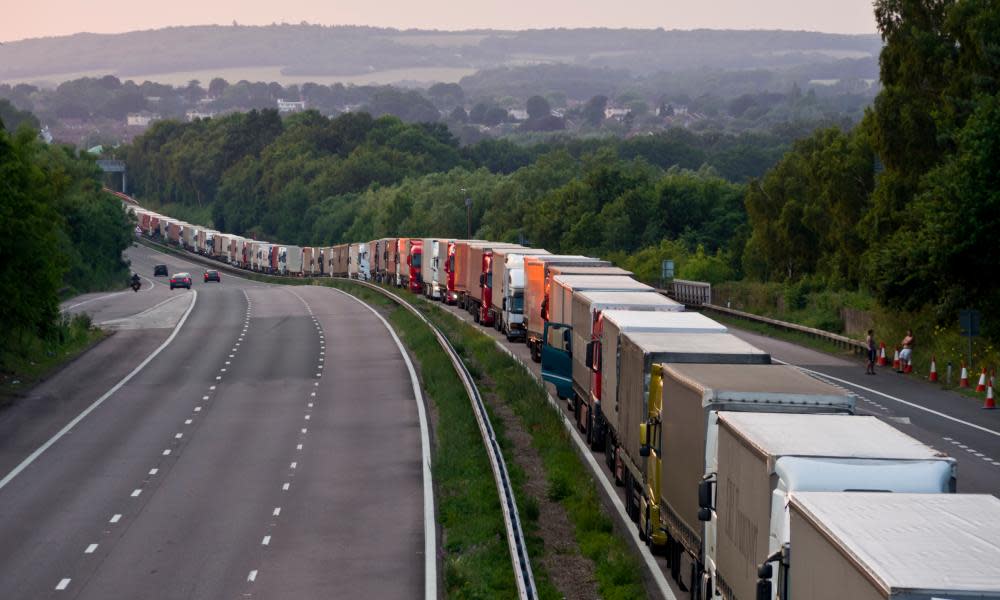The Kent border: I have a secret plan to reunite our divided country – and it involves traffic jams

There is to be a new land border with Kent. Technically, it isn’t a border; it is just that lorries won’t be allowed into the county from the rest of England unless they have their paperwork in place, which in the absence of a drone-recognition system means police patrolling the boundaries. So, a border.
It throws up a few technical questions: does this mean Kent is now in France, or is it a Liechtenstein-style principality? Can it have its own currency, and will it be pegged to sterling? What ramifications, if any, does this have for Scottish independence? Can Kent ever have a referendum on rejoining the United Kingdom? Will some county cricket matches now become tests? Will we be all right if we have a Kentish grandparent? Because, happily, I did.
I feel like a dolt that I didn’t see this coming, but then remember that, with some instinct that is beyond eerie, Mr Z predicted it all. We were in Eynsford, Sevenoaks, home of my late grandmother, though I couldn’t remember which was her house – all I could remember was that it had a grassy bank leading up to the front door. All the houses have that – they don’t call it the Garden of England for nothing, you know – and anyway, we weren’t on a Williams pilgrimage, we were there to see Eynsford castle, some ruin I’d never heard of because the Williamses definitely weren’t into that kind of thing.
The children and I were all moaning: I hate Anglo-Saxons and they hate being outdoors. The year was 2016. We were complaining before we even got out of the car, and Mr Z came up with an elaborate ruse that we had to see Kent fast, today, because it was shortly to be demolished and repurposed as a swearword. The children weren’t young enough to believe him, but they were definitely young enough that when they walked into a cafe shouting “Kent!” at each other, that was a really bad look.
Anyway, and so it has come to pass – Kent will become a byword for consequences so bad, so weird, so utterly impossible to claim were intended that it is basically a swearword. Surveying the dystopian traffic of the Dartford crossing, people will spontaneously exclaim: “Kent!”
The worst of all possible hot takes, and so inevitably the one that is all over social media, is that this is funny, since the area voted leave and had this coming. Never mind that no one mentioned borders, or seven-mile tailbacks, or lorry drivers stranded in desolate parks that are now without toilets or vending machines; it is a misrepresentation of the politics of the area. Kent may have wanted to poke Westminster in the eye, but it has been resisting Nigel Farage since before much of the country had even heard of him.
Farage brought his A game to South Thanet, by which I mean he courted the area with the most obnoxious manoeuvres his imagination could yield. He held a hustings in 2015 that was men-only. He trailed about with bodyguards to give the impression that he was in dire personal danger from assorted elites, sorry, “hard-left activists”. He pulled out all the stops to set women against men, snowflake against anti-snowflake, white-wine-spritzer drinkers against pint drinkers, made Thanet the crucible of his culture war, stood for election in 2015, and the electorate came back with a gentle: “Thanks, but maybe some other time.” The people of Ramsgate and Dumpton Park are no more responsible for the Kentish border than those of Hackney and Hartlepool.
In fact, what the county may become instead is the cradle of national reconciliation. You would think a pointless border would be a solid thing to unite against, but the case of Northern Ireland shows why it isn’t: it leads inexorably to constitutional matters, and those conversations are like quicksand. Once you’re in them, there’s no getting out, and you all get covered in sand, and – to tweak a quote often attributed to George Bernard Shaw – the pig enjoys it.
This latest development is not really about borders, though – it’s about traffic. In every particular, from export queues to paperwork checks, it will boil down to traffic. The sharp edge of politics, the bit where it touches every citizen, regardless of whether or not they’re at all interested in it, will be traffic. You can meet someone who would happily see GDP drop 10% for extra sovereignty, and you can meet someone else who is against car travel altogether, and they will be united against one thing: traffic. This could be the breach that reunites the kingdom.

 Yahoo News
Yahoo News 
